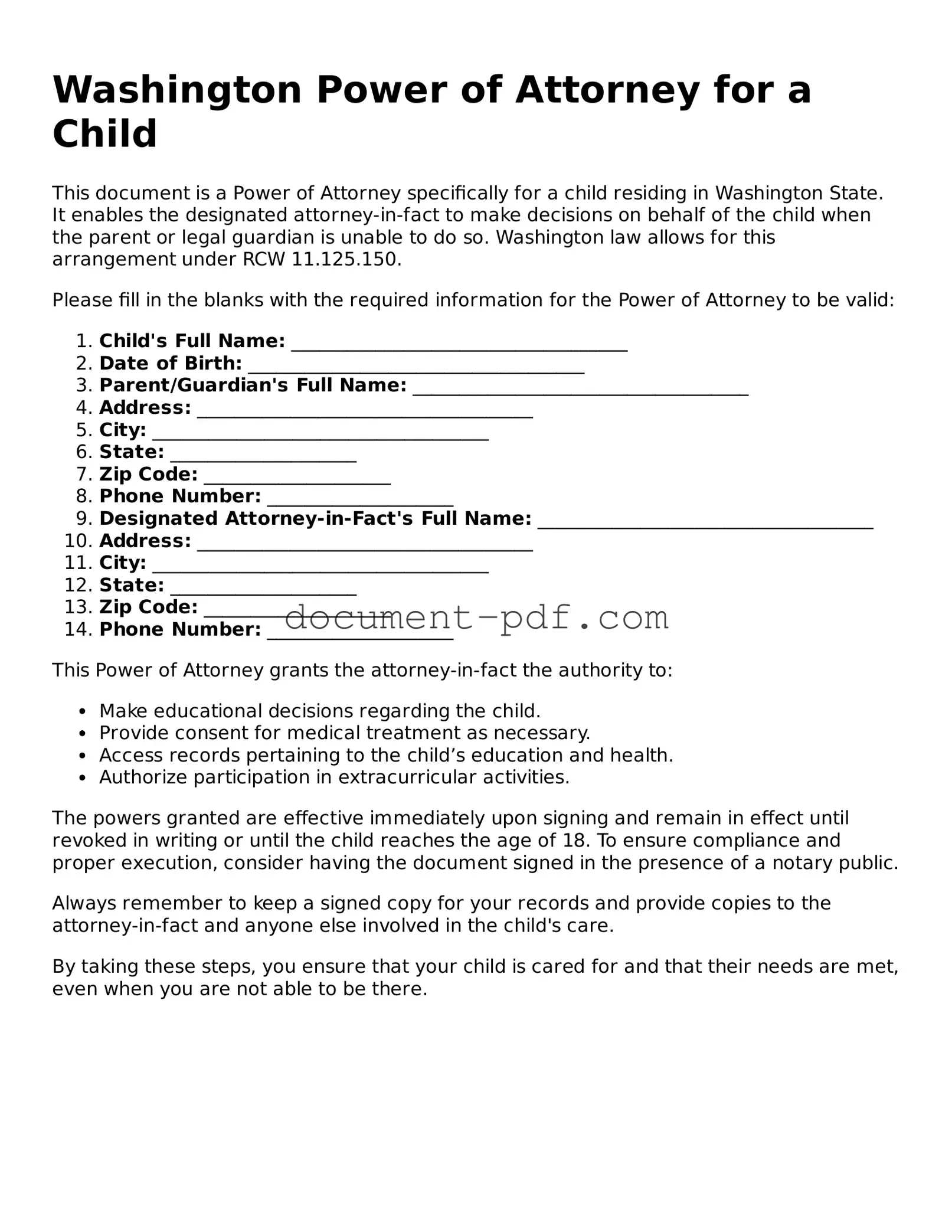The Washington Power of Attorney for a Child form shares similarities with the General Power of Attorney. Both documents allow an individual to designate someone else to act on their behalf. However, the General Power of Attorney can apply to a wide range of situations, including financial and legal matters, while the Power of Attorney for a Child specifically focuses on decisions related to the care and well-being of a minor. This ensures that the designated individual has the authority to make decisions in the best interest of the child during the absence of the parent or legal guardian.
Another related document is the Medical Power of Attorney. This form specifically grants authority to someone to make medical decisions on behalf of another person. Similar to the Power of Attorney for a Child, it is often used when the individual is unable to make those decisions themselves. In the case of a child, this document can be crucial for ensuring that a trusted person can make healthcare decisions, especially in emergencies or when parents are unavailable.
The Temporary Guardianship form also bears resemblance to the Power of Attorney for a Child. Both documents are used to ensure that a child is cared for in the absence of their parents. However, Temporary Guardianship typically involves a more formal arrangement, often requiring court approval, whereas the Power of Attorney for a Child can be executed more quickly and easily without the need for court intervention. This makes the Power of Attorney a more flexible option for short-term situations.
The Child Custody Agreement is another document that aligns with the Power of Attorney for a Child. While the latter allows for temporary decision-making authority, a Child Custody Agreement outlines the long-term arrangements regarding where a child will live and who will make important decisions for them. Both documents aim to protect the child's best interests, but they operate within different timeframes and legal frameworks.
The Authorization for Release of Medical Records form is similar in that it allows for the sharing of a child's medical information with designated individuals. While the Power of Attorney for a Child grants authority for decision-making, the Authorization for Release of Medical Records specifically focuses on access to health information. Both documents are essential for ensuring that the designated individuals can act in the child's best interests regarding health care.
When considering the transfer of property ownership, it is vital to use the appropriate legal documents. For anyone looking to navigate property transactions in Georgia, understanding the complexities of the Georgia Deed form is crucial. You can access essential information about preparing the document by visiting the Georgia Deed preparation guide.
The Consent for Treatment form also parallels the Power of Attorney for a Child. This document allows a designated individual to give consent for medical treatment on behalf of a child. While the Power of Attorney provides broader authority, the Consent for Treatment is often used in specific situations where immediate medical care is required, ensuring that a trusted person can act quickly to protect the child's health.
The Child Care Agreement is another document that can be compared to the Power of Attorney for a Child. This agreement outlines the responsibilities and expectations between parents and caregivers. While the Power of Attorney grants legal authority to make decisions, the Child Care Agreement serves more as a mutual understanding between parties regarding the care of the child. Both documents aim to ensure the child's welfare but do so from different angles.
The IEP (Individualized Education Program) is also relevant when discussing the Power of Attorney for a Child. An IEP is designed for children with special needs and outlines the educational support they require. Although the Power of Attorney for a Child does not specifically address educational matters, it can empower a designated individual to advocate for the child's educational needs, ensuring that they receive appropriate services and support.
Lastly, the Child Support Agreement can be seen as similar in that it addresses the financial responsibilities for a child's upbringing. While the Power of Attorney for a Child focuses on decision-making authority, the Child Support Agreement ensures that financial support is provided. Both documents aim to safeguard the child's welfare, but they do so through different means—one through authority and the other through financial obligation.

